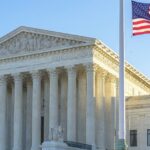




France just dropped a diplomatic bombshell at the United Nations, recognizing a sovereign Palestinian state in a move that’s got the international community buzzing.
The Washington Examiner reported that during an address at the 80th U.N. General Assembly on Monday in New York, French President Emmanuel Macron announced his nation’s formal acknowledgment of Palestinian statehood, framing it as a step toward a two-state solution while drawing sharp criticism from the U.S. and Israel.
This didn’t come out of nowhere—back in July 2025, Macron signaled France’s intent to support Palestinian sovereignty as part of a long-standing commitment to Middle East peace.
It’s a bold play, and one that kicked off a wave of similar commitments from other nations. Talk about setting the stage for a diplomatic domino effect.
On Sunday, September 21, 2025, the day before the U.N. session began, the United Kingdom, Canada, Australia, and Portugal also pledged to recognize Palestinian statehood.
It’s a coordinated push, no doubt inspired by France’s leadership on the issue. But not everyone’s clapping—some see this as a risky precedent.
Macron’s speech earned a standing ovation from supporters of the Palestinian cause at the U.N. Assembly. He didn’t hold back, pointing to expanded military actions in Gaza, the potential expulsion of Gazans to Egypt, and West Bank annexation threats as urgent reasons for France’s decision. The man knows how to make a case, even if it ruffles feathers.
Speaking of feathers, Macron declared, “I declare that today France recognizes the State of Palestine.” That’s a direct line in the sand, folks. But does this recognition bring peace closer, or just pour fuel on an already blazing conflict?
The United States, under President Donald Trump’s administration, dismissed the move as symbolic at best and dangerous at worst.
Concerns from White House officials center on how this could derail stalled negotiations for hostages held by Hamas since the horrific October 7, 2023, attacks. They’re not wrong to worry—timing matters in diplomacy.
Israel’s reaction was even sharper, with officials arguing that recognizing Palestinian statehood now might embolden terrorist groups. Israeli Ambassador to the U.N. Danny Danon called the move “detached from reality.” That’s a polite way of saying they think it’s a terrible idea.
Hamas, unsurprisingly, hailed the recognition by France and the other four nations as a triumph for Palestinian rights. Meanwhile, the U.S. fears this could stall efforts to end the Gaza conflict and free hostages. It’s a messy web—good intentions on one side, grim realities on the other.
Macron didn’t shy away from history, recalling the U.N.’s 1947 plan to divide mandatory Palestine into Jewish and Arab states—a promise he says remains unfulfilled for Palestinians. It’s a poignant point, but critics might argue ancient resolutions don’t address today’s security threats. History is a guide, not a blueprint.
The French president also acknowledged the deep pain on both sides, calling out the “twin solitude” of Israelis scarred by the 2023 attacks and Palestinians enduring ongoing war. It’s a rare moment of balance in a polarized debate. But empathy alone won’t solve this crisis.
On the flip side, U.S. officials like Secretary of State Marco Rubio noted that Hamas walked away from negotiations the moment France made its announcement. If true, that’s a gut punch to hopes of de-escalation. Actions have consequences, even well-meaning ones.
President Trump is set to speak at the U.N. General Assembly on Tuesday, September 23, 2025, with a focus on peace, sovereignty, and liberty.
He’s also slated for bilateral and multilateral meetings with world leaders during his visit. Expect him to counter France’s move with a strong defense of Israel’s security needs.
Palestinian officials, meanwhile, remain in a permanent observer status at the U.N., with full membership discussions likely to face a U.S. veto in the Security Council, according to American Enterprise Institute senior fellow Brett Schaefer. It’s a reminder that recognition is one thing, but real change at the U.N. is another. Power dynamics still rule.



